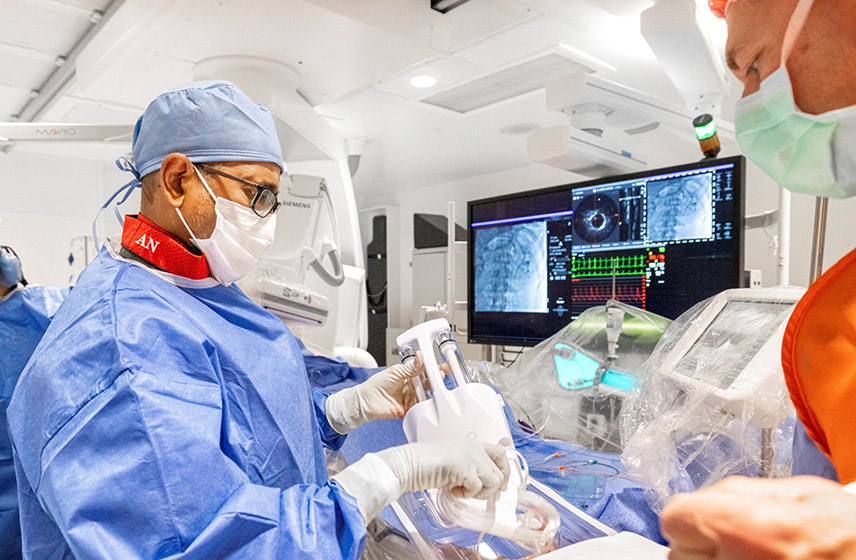
Renal Denervation
You’ve stepped up the cardio and cut back on salt. You take your medications without fail — but you still have high blood pressure (hypertension). Is there anything else left to try? At Cleveland Clinic London, we are one of a few select private hospitals in the U.K. specialising in minimally invasive renal denervation. This treatment can help lower your blood pressure and keep it there. Ready to take the next step? We can have you booked for an initial evaluation as soon as possible.
Why Choose Us for Renal Denervation?
Collaborative care:
Teamwork is an important part of your care. Our interventional cardiologists will guide your treatment, working alongside endocrinologists and interventional radiologists to provide the latest treatments. Meet our team.
Specialised equipment:
When you come in for your procedure, you’ll undergo renal denervation in a cardiac catheterisation lab equipped with the most current tools and technologies. Real-time imaging provides our team with enhanced views of the treatment area, enabling us to deliver precise care.
Convenient care:
We will book a visit for you promptly and coordinate additional pre-procedure assessments. If your renal denervation is a good fit for you, you’ll receive treatment within a few weeks at the latest.
Why You May Need Renal Denervation
Nerves in your kidneys (renal system) receive signals from your brain to help manage your blood pressure. When you have hypertension, these signals kick into overdrive, causing your blood pressure to rise and stay elevated.
High blood pressure is a leading cause of heart attack, kidney damage and stroke, which is why blood pressure management is essential. When you have resistant hypertension, you’ve likely tried different medications and lifestyle changes with little to no results. That’s where renal denervation may help. We use focused energy to suppress overactive nerve signals during this minimally invasive procedure.
Your Renal Denervation Evaluation at Cleveland Clinic London
Before we start treatment, you’ll have an evaluation with one of our experts in interventional cardiology. This visit allows us to learn more about your condition and to determine if renal denervation is right for you.
Your consultant will spend time talking with you about the high blood pressure treatments you have already tried and your overall health. They will review your medical history and do a physical exam. They will also order tests, including:
- Blood tests to assess how well your kidneys work
- CT scan or MRI to show a closer look at blood vessels
- Hormone screening to rule out thyroid or other endocrine system conditions
After you conclude testing, our team will review the results and determine if you are eligible for private renal denervation. If so, we can typically start treatment quickly.
Consultants Who Perform Renal Denervation
Locations
Our consultants see patients in modern and technologically advanced facilities in the heart of London.What To Expect from Your Renal Denervation
Renal denervation is minimally invasive, meaning you won’t have large incisions. Instead, our team will make small incisions in your groin to move a catheter through a blood vessel to your kidneys with the help of high-definition, real-time imaging. We will use a local anaesthetic to block any discomfort. You may also have sedatives that make you feel sleepy and relaxed.
When our interventional cardiologists reach your kidneys, they will use sophisticated instruments to deliver bursts of energy at the catheter tip to disconnect the nerves. This causes them to stop receiving signals from the brain. After the procedure, you’ll recover in a private room for a few hours and can typically go home later that day.
After your procedure
You will see your interventional cardiologist for a follow-up visit a few weeks after the procedure to make sure you’re recovering as expected. We’ll also see you periodically over the next six months to check your blood pressure and see how well your kidneys are working.
You may experience a modest drop in blood pressure shortly after renal denervation. For most people, blood pressure continues to decrease over the next 12 months — and you’ll likely find you need fewer blood pressure medications and smaller doses.
Billing Services at Cleveland Clinic London
Once you decide to proceed with treatment, we’ll provide you with an estimate including the most transparent pricing possible for self-pay services. We also accept most private medical insurance.
What’s Next?
Seeing high blood pressure readings day after day can be stressful. You know worrying about it won’t decrease those numbers, but where can you get expert care and support? Cleveland Clinic London has a team of experts dedicated to treating resistant hypertension. You can count on us to provide personalised care and offer advanced minimally invasive treatments.
Appointments
Ready to see us? We’re ready for you and look forward to the opportunity to assist with your needs. We’re available to take your call Monday through Friday, 7:30 a.m. to 8 p.m. and Saturday, 7:30 a.m. to 3 p.m. You’re also welcome to request an appointment online.
Self-Pay
We offer convenient self-pay services. But what does that mean? With this option, you’ll benefit from transparent pricing, access to unparalleled care, and the expertise of our consultants.
Private Insurance
Need help using your private insurance? We make it easy to get your referral, authorisation and make sure everything’s covered so you can come into your appointment with one less thing to worry about.
